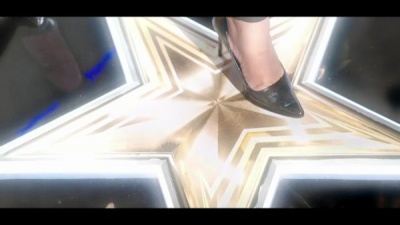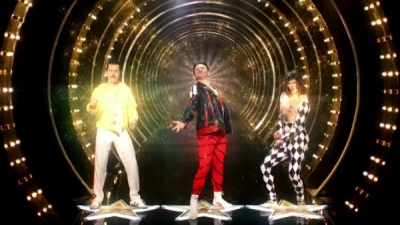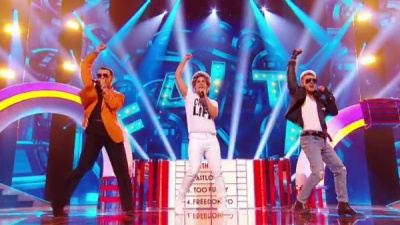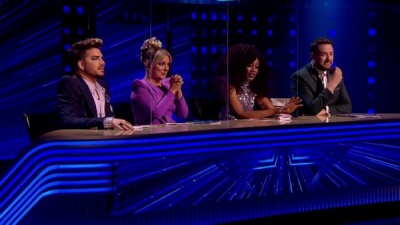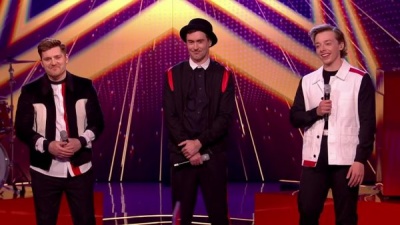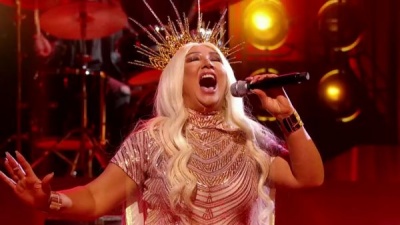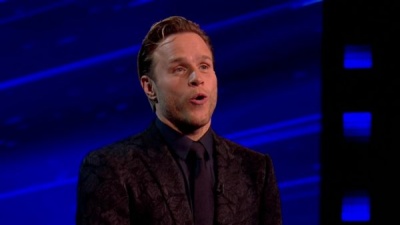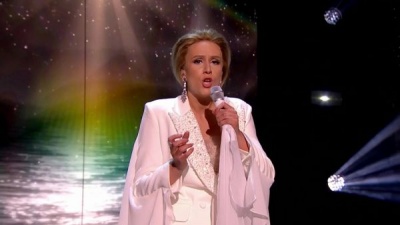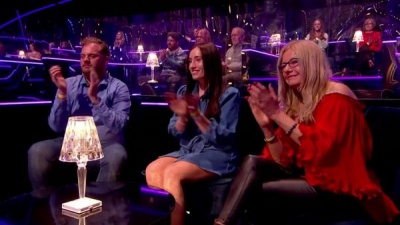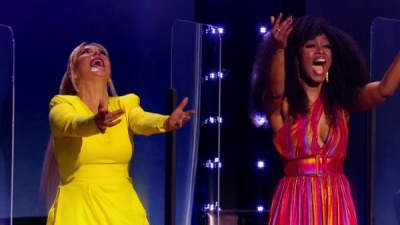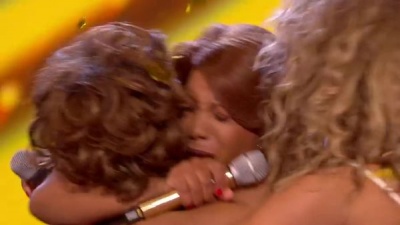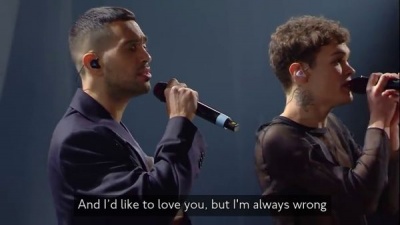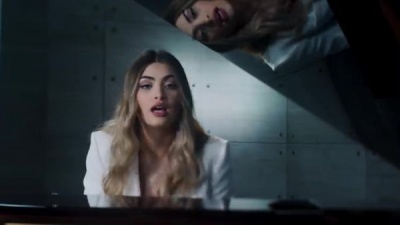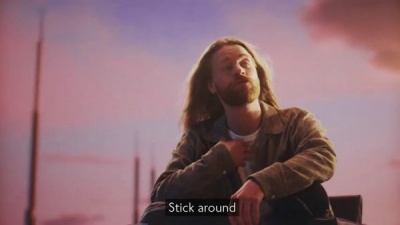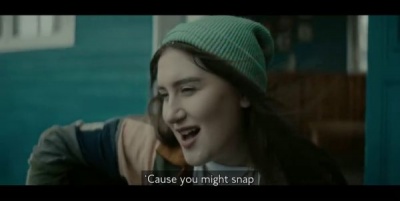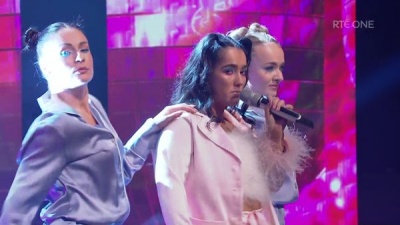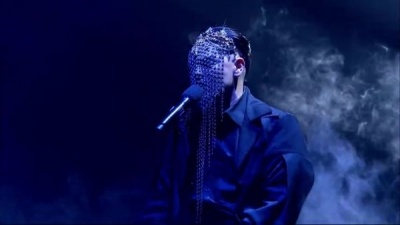Weaver's Week 2022-03-27
Last week | Weaver's Week Index | Next week
It's a music special this week. Later, the closest Counterpoint final in ages, and some thoughts on some of this year's Eurovision Song Contest entries. But first!
Contents |
Starstruck
Remarkable Television (part of Banijay) for ITV, from 12 February
In the beginning, there was Stars in Their Eyes, a show that wouldn't change your life, but wouldn't ruin it either. A Saturday night mainstay through the 1990s, and briefly revived by Harry Hill a decade back, Stars in Their Eyes was a pleasantly low-key bit of fun.
There's been a revival of the show, and it's a bit different. Not only is there a new title, and a new host – Olly Murs – but there's a judging panel! And a big cash prize!
The basic concept remains the same. Through the hard work of costumers and make-up artists, through clothes and wigs, ordinary people are transformed into famous singing stars. And they perform – as their chosen star – on national television.
For Starstruck, there's a change. Now, there's not just one performer, but a team of three. A group of three amateurs is introduced: we find who has worked on a cruise ship, who works behind a bar, and who has an office job. They explain what their chosen performer means to them, and then we find who they're singing as.
Through CGI trickery, each transforms from their drab civilian life into a proper pop star's outfit. The look, the sound, it works. For all three of them, George Michael. Each is at a different stage of his career, this helps later in the show.
Our three performers stride onto stage, and sing a version of their star's big hit. Each has some solo lines, each is part of the chorus. It's their moment in the sun, to shine brightly.
And then come comments from the judges. There's a panel of judges – Sheridan Smith, Jason Manford, Adam Lambert, Beverley Knight. These are the people who react to the performances, who stand up and cheer, who do groovy desk-bopping, or dad-dancing from Jason Manford.
Inevitably, the judges say how wonderful everything was. The critique is anodyne to the point of being completely useless, grading on a scale from "super" to "smashing" tells us nothing.
Rinse and repeat for four performances in each show. The first episode featured three Ladies Gaga, three Arianas Grande, some Marvins Gaye, and a trio of Freddies Mercury. Later episodes included a mixed group of Chers, some Tinas Turner, and they impressed the host with Ollies Murs.
Once everyone's performed, the judging panel choose one of the trios to sing again. They perform another song from their star. Viewers watching from home pick one to send through to the series final – that's why every performer is dressed differently, help the voters pick out their fave. Why not let the studio audience pick? This show was recorded deep in the ongoing health emergency, and the only guests in the studio were supporting the performers. It's not fair to decide the winner based on the size of their bubble.
Winner from each episode comes back for the grand final, and a prize of £50,000. Olly mentions it two or three times an episode: he doesn't ram it down our throat like Walk the Plank did, but nor are we allowed to forget it.
Hit, miss, or maybe?
We've found Starstruck to be a curate's egg. Some bits are excellent, some are not so good.
Really liked the scale of the performances. They're big and imposing, everyone involved is clearly living their dream and enjoys every second of it. The fun is contagious, it comes through on screen.
They've cast and trained well. Quality of the vocals was top-notch, choreography very good. Because of the ongoing health emergency, not too many backing dancers, those we do see are great.
The makeovers have a new style. The smokey doors of the past are gone, replaced by CGI trickery. It feels a bit less of an event now we can see the magic happening.
Something we're not told: most of these people are semi-professional performers. They have day jobs – barista, driving instructor, cabin crew – to support their passion. We never hear anything factually untrue, but the producers are very careful about what they say.
Does this change the context of the show? For us, it does. Semi-professional performers are going to be great singers and feel like their star, which makes for better television and eases the producers' job. But it's not the narrative we expect from Stars in Their Eyes – Gladys from the supermarket has a secret passion to be Shirley Bassey, and has a once-in-a-lifetime opportunity to be Shirley Bassey. When contestants are already being paid to be like Freddie Mercury, it's not such a rare event.
Does this damage the show? Not particularly. We lose the amateur ethos, we gain excellent performances from everyone on stage. And it gives more justification for denying people a solo performance in the heats – it could be seen as undue prominence. Why give airtime to just one Lisa Stansfield tribute when we've had three, and a reason why this one is the best.
We really don't like the panel. They're certainly not offering destructive criticism, but they're not offering constructive criticism. They're just talking heads. Every minute while we hear Adam Lambert or Sheridan Smith blether on is time we're not being entertained. Watching people sing and dance is entertaining. The build-up is tolerable; the debrief is dull.
Nor are we pleased to see Perspex panels being so soundly and completely abused. If you can't judge without banging the walls, we'll just have to move your desks further apart. Don't you know there's a health crisis on?!
Starstruck is on a commercial channel, and has adverts. When we twigged that they always went build-up, performance, judges' witterings, ad break, we could zap through a lot of the show – and the adverts – in a trice. Without the zapper, if you're watching live, it's agony. Yes, we know that ITV goes at a slower pace than this column, but we hoped that ITV would move faster than a snail on the M25 in rush hour.
Reduced to its bare essentials, Starstruck is tolerable. We've never much liked Stars in Their Eyes, the only versions that worked were celebrities or Harry Hill's sketch show with a competition bolted on. This series doesn't give us reason to watch, but nor do we begrudge it being on.
Eurovision Song Contest preview
As we've done in the last few years, we're going to look at some – but not all – of the entries. We're eyeing up the anglophone broadcasters (SBS, BBC, PBS), plus the hosts RAI, and Junior Eurovision winners AMPTV. We've already reviewed RTÉ's entry in its national final, we were impressed and rank it a Hit. The options we're choosing between are Hit, Miss, and Maybe.
"Brividi" represents host broadcaster RAI ("Italy" on screen). It's performed by Mahmood and Blanco – one has a falsetto voice, the other a youthful tenor. It takes a long time to build into something approaching a chorus, and the slow-paced number needs something to break it up. And it gets it – a near-rap break, then a short battling duet section before the final chorus. The song's performed entirely in Italian. On first listen, we don't properly get it, but we do get that there's some depth and quality to appreciate. Will viewers on the Saturday night give this song the space it needs? Maybe.
"Snap" represents AMPTV ("Armenia"), performed by Rosa Linn. There's a lot of Sad Boy (TM) music this year, and only a little Sad Girl (TM). This is exactly the sort of music we'd choose to listen to – in the ballpark of Haim and Taylor Swift and Girl In Red. Rosa is chewing a wasp in the verse, brooding over something lost, then a memorable chorus that uses simple English, building to an emotional release for the end. The staging will be interesting: are they going to recreate the flying house from the music video? On first listen, this is going through to Saturday night, this could be challenging for the top quarter. And that's Hit.
"I am what I am" for PBS ("Malta"), performed by Emma Muscat. Starts as a solo woman at a piano, with a pleasant alto voice. The song quickly builds into an anthem for acceptance, "Take it or leave it, I am what I am". It's performed at a moderate tempo, all lighters in the air, and it's going to be one for the Euroclub when that opens back up. Backing vocals give a gospel feel to the final choruses. The staging is unlikely to be a surprise, just as the song was predictable from the first moments. To be honest, this doesn't grab us straight away: it's good but doesn't feel great. Maybe.
"Not the same" is the entry from SBS ("Australia"), performed by Shelton Riley. Sad Boy (TM) at its best, a piano ballad and high emotions, Shelton's vocal range is tested and comes out with flying colours. That man can sing, a fact that will give him great scores from the jury. Will he connect with the viewers? He wears a beaded veil in the SBS final, taking it off at the emotional climax near the end – an action dramatising the song for viewers who don't speak English. It'll get through to Saturday, score decently with the juries, but what of the televote? A very high Maybe.
"Space man" is the BBC ("United Kingdom") entry, performed by Sam Ryder. Falsetto singing, four-line stanzas with a repeating last line. The chorus is very different from the verse, the middle eight is something else. There is great craft in this song, it'll bear repeated listens. Everything seems familiar from somewhere, not that we know where. The song has some blatant padding to use the full three minutes. It's competent, well-sung, and fits Sam's voice, and we could only say one of those things about the BBC's last entry. Maybe.
A week later
It's fair to come back to the songs a little later, see what happens when we know what happens. Technical impression more than artistic merit. We're trying to see how much – or little – support there could be...
"Brividi" still does nothing for us, and nothing against us. It's solid, capable, competent. Viewers who watch the show as a spectacle might want to see the performers again; will they vote for it? Hosts' songs tend to do poorly, RAI songs tend to do well. This could end up anywhere, though we'd be very surprised if it's top-left quadrant. Maybe.
"Snap" has been living rent-free in our head for the past week. The stompy song has an inbuilt call to action: tap feet, drum fingers. Will we see the audience join in? Are we going to feel like one big gang, flying away from all ~~this~~ with one snap? Why is Rosa Linn's back catalogue so small? What is Yerevan like at this time of year? Hit.
Let's re-assess "That's rich". It's an uptempo bop in a mid-to-downtempo contest, so it's going to stand out. Brooke has the stage presence to hit the audience in the feels, not sure she's got the vocal quality to get huge points from the jury. Much will depend on how RTÉ stage the song. Saturday night feels likely, top-right quadrant feels about right. Now we've heard some of the competition, the song comes down to a high Maybe.
"Space man". We want to like this. We really want to like this. It's a beautifully crafted song, Sam performs with quality and distinction. It's intensely hummable, it's clearly a grower, and Sam is doing well to travel Europe exposing his song to new audiences. Yet we've no particular connection to the song: no reason to vote for it, no reason to root against it. Is it going to stand out from the crowd? Will viewers be familiar with the song – Sam is big on Tiktok, and that gave the song legs before we knew it was the BBC's entry. Again, much will depend on how the song's staged – and from past experience with the BBC, we have absolutely zero confidence they'll get the staging right. With decent staging, there is a path to the bottom-left quadrant, we'd be chuffed if it gets higher. Maybe.
"I am what I am". Indulge us for a moment. About 35 years ago, Coca-Cola ran a commercial called "Tomorrow's people". Shot in a massive hall in Liverpool, the spot starts with a solo female singing about her hopes for the future. As the advert continues, more friends join in – all cradling a bottle of the brown beverage in the palm of their hands, singing the closing line in unison, "Promise us tomorrow, and we'll build a better world for you". We get the same vibes from Emma Muscat's song: optimistic, sickly sweet, treats boundaries and borders with the contempt they deserve, a bit anodyne. There is a path to Saturday, if it gets there we can't see this getting above the bottom-right quadrant. Slightly charitably, a Maybe.
"Not the same". It's a vocal showcase, Shelton's top-notch performance sells the song. We can see juries falling over themselves to rank this very high. Is it going to connect with the viewers at home? Let's assume they repeat the SBS final performance: it's simple, uncluttered, memorable. Top-left quadrant feels possible, if he's lucky. We're going to upgrade this to a Hit.
Good news, we're not going to review the remaining 34 entries. We want to look at other stuff before Eurovision – Dara Ó Briain's One and Six Zeros next week, and later explain why Bridge of Lies is to daytime quizzing as "Snap" is to the contest. We'll come back to Senior Eurovision for semi-finals week on 10 and 12 May, and the final starts on 14 May.
In other news
Quizzy Mondays reached a climax. The Counterpoint final on Radio 4 was played by three women, which has never happened before. It went to a one-question tiebreak, which we can't remember happening before. Frankie Fanko beat Isabelle Heward on the buzzer, and won the title. Frankie has tremendous quiz pedigree, she was one of the 007s, champions on Only Connect (2) a couple of years ago and made inroads on the various Who Wants to be an Egghead shows a decade back.
University Challenge saw Imperial London beat Emmanuel Cambridge by over a hundred points. The best bits were at the beginning for Emmanuel, they took a handy lead into the first visual round, but UC is a marathon not a sprint. Imperial got almost all the starters, and many bonuses, and never looked like they'd be headed.
Strong performances on Mastermind, where Anthony Fish showed more excellent general knowledge skills, notching 14 points. This time, his specialist subject work made the different – 13 points on 20th century heavyweight boxing was five clear of the field. Andrew Fanko actually made 15 general knowledge points, but was six adrift after being overwhelmed on African World Heritage sites.
It's finals week on Dancing with the Stars (RTE1, Sun) and Dancing on Ice (VM1 and ITV, Sun), and banquet week on Great Local Menu (BBC2, Mon-Fri). Radio's most intellectual quiz returns, Kirsty Lang takes the chair of Round the Islands Quiz (Radio 4, Mon).
Small thrills: The Great Big Tiny Design Challenge with Sandi Toksvig (More4, Sun) builds a miniature house, complete with tiny food. On Thursday, Gordon Ramsay's Future Food Stars (BBC1) tries to find someone worthy of his investment. He still owes us for the time we wasted on Bank Balance. Speaking of wasted time, Have I Got News for You is back (BBC1, Fri).
Saturday stars: Nikki Fox on Stephen Mulhern's Celebrity Catchphrase (ITV), Sonali Shah – we never bet against Newsround alumni – on Celebrity Mastermind (BBC1). George Ezra performs on Saturday Night Takeaway (ITV), a Pointless Celebrities sports special with more Biancas than footballers (BBC1), and the Starstruck final (ITV).
Pictures: Remarkable Television, RAI, PBS, BBC, AMPTV, RTÉ, SBS.
To have Weaver's Week emailed to you on publication day, receive our exclusive TV roundup of the game shows in the week ahead, and chat to other ukgameshows.com readers, sign up to our Google Group.


